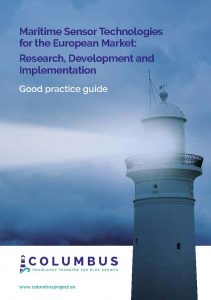 The Horizon 2020 COLUMBUS project has delivered a new guide sharing best practices, highlighting bottlenecks, and giving recommendations for a successful knowledge transfer in maritime sensor technologies.
The Horizon 2020 COLUMBUS project has delivered a new guide sharing best practices, highlighting bottlenecks, and giving recommendations for a successful knowledge transfer in maritime sensor technologies.
Over the course of successive EU Framework Programmes, the European Commission has made a significant investment in research and innovation projects designed to advance ocean observing and monitoring capacities through the development of marine environmental sensing technologies. However, the Commission’s vision to deliver a suite of new sensors which would be a commercial and operational success and support key policy and management objectives has not yet been fully realised. Ex-post assessment suggests that there is a disconnect between the ambitious goals set out in the original call texts, and what is actually achievable within the confines of a 3-4 year collaborative research project. Some of the EU projects have been successful in commercialising products, demonstrating prototypes, and transferring innovative software to industry. Yet, the development of many promising technology leads has now stalled and may not be advanced any further because the project funding cycle has ended.
The guide gives recommendations in the following areas:
- Designing the funding call and the project with knowledge management and expected impact in mind;
- Advancing marine technology intellectual property through a virtual market place;
- Boosting the market through policy and regulation.
The guide emphasizes future calls in the area of marine sensor development should set out very clear and achievable expectations. They should allow for realistic proposals and discourage the kind of over-reach on behalf of the proposers which is common and increasingly necessary in a highly competitive R&D environment. Equally important is to ensure that the ‘need’ or ‘demand’ according to which the call was launched is real and has been identified in collaboration with the proposed end-users/implementers of the new technology.
The guide may be of interest to a wide audience but is particularly targeted at funding agencies commissioning marine technology research and at technology developers (private and academic) engaged in such research. Technology implementers and intermediaries will equally be interested in some of the recommendations and findings.
The Horizon 2020 COLUMBUS project, which ended in February 2018, worked to identify and transfer unexploited knowledge generated by EU-funded science and technology research to actors with the potential to capitalise on it for a measurable value creation.
This COLUMBUS guide was developed as a result of discussions with COLUMBUS and AtlantOS project partners, speakers and participants at the COLUMBUS Brokerage Events ‘Knowledge Transfer in Maritime Sensing Technologies’ on 23 November 2017 (AtlantOS General Assembly 2017, Gran Canaria) and on 23 January 2018 (EuroGOOS Headquarters, Brussels).
Download the publication















































